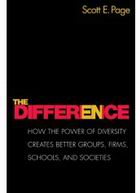 I met Scott Page at the Santa Fe Institute a few years ago. He is a prof at the University of Michigan and has just authored a book: The Difference: How the Power of Diversity Creates Better Groups, Firms, Schools and Societies. I have read a pre-release copy. He has a notably different, quantitative and welcome view of the subject. This is a book about predictive sociology, and it shows some physics envy along the way. Non-technical, few equations, and those mathematical relationships that are used are accompanied by easy numerical examples. (Full technical papers pointed to in his home page, above) So its an easy read. Makes the obvious comparisons to 'smart mobs', 'wisdom of crowds' and related ideas of recent years. Provides some useful conditions for the application of diversity to problems.
I met Scott Page at the Santa Fe Institute a few years ago. He is a prof at the University of Michigan and has just authored a book: The Difference: How the Power of Diversity Creates Better Groups, Firms, Schools and Societies. I have read a pre-release copy. He has a notably different, quantitative and welcome view of the subject. This is a book about predictive sociology, and it shows some physics envy along the way. Non-technical, few equations, and those mathematical relationships that are used are accompanied by easy numerical examples. (Full technical papers pointed to in his home page, above) So its an easy read. Makes the obvious comparisons to 'smart mobs', 'wisdom of crowds' and related ideas of recent years. Provides some useful conditions for the application of diversity to problems. Even in the introduction, though, Page makes the point that the theory of relativity was not outlined by a diverse crowd, but by a single patent examiner with a penchant for thought experiments. Perhaps the deepest quandary I have with this book is its definition and positioning of the term diversity itself. He gives lots of useful examples of diversity of problem solving methods and cognitive approaches. He then uses business interest in diversity to support his tabletop models, stretching his definition of diversity. His arguments, when they address the gorilla-on-the-table world of identity diversity vs cognitive diversity include too many statements starting 'If we believe that ...' to convince me. Despite that, this is a thought-provoking and well-written book that makes you think about the problem, and the first time I have seen an attempt at using logic to address this issue.
No comments:
Post a Comment